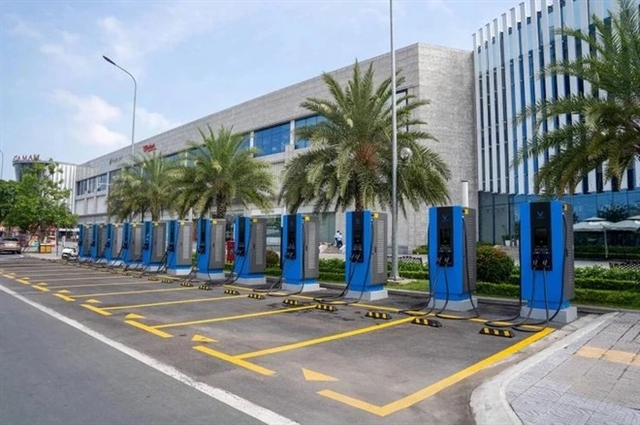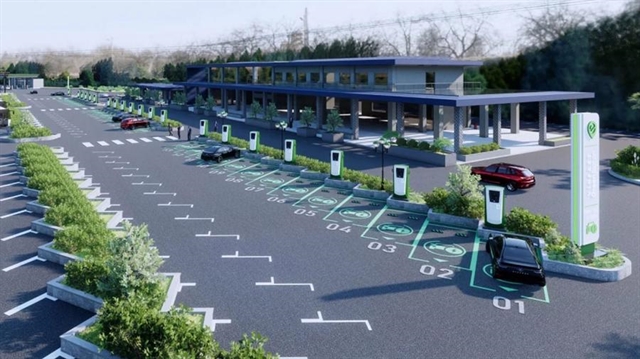 Economy
Economy

 |
| A charging station of VinFast. The transition to electric vehicles (EVs) in Việt Nam represents a complex challenge that requires coordinated efforts across various sectors. — Photo courtesy of VinFast |
HÀ NỘI — The move to electric vehicles (EVs) in Việt Nam represents a complex challenge that requires coordinated efforts across multiple sectors, according to a World Bank report.
The Government plays a crucial role in facilitating and optimising cooperation among key stakeholders—public and private sectors, financial institutions and individual consumers. This process involves strategic planning, policy support and financial incentives to drive adoption and investment.
A transition to electric vehicles will require production and procurement, a power grid upgrade. It will need a comprehensive charging network to be established and and an improvement in battery recycling capacity.
EV production and procurement
Việt Nam's EVs production and assembly sector presents a significant opportunity for industrial growth and job creation. This growth is primarily driven by private sector investments, which will be crucial for expanding production capacity.
The Government plays a critical role in fostering an environment conducive to investment. Key supportive policies may include preferential land prices, tax exemptions and public-private partnerships (PPPs).
To expand EV production, private investors can find resources from bank financing, capital markets and financial intermediaries. The World Bank emphasises the need for transparent policies that simplify the financing process for private investors.
Increase in the electric vehicles sales is largely driven by individual consumers and transportation service providers. As Việt Nam transitions to EVs, the Government's role includes both financial and non-financial incentives.
However, the World Bank advises against direct subsidies for buying electric, suggesting a more sustainable approach to supporting EV adoption without distorting the market.
The World Bank’s 2023 report on the 'Economics of Passenger E-Vehicles' provides critical insights into the effectiveness of direct purchase subsidies, particularly in developing countries, arguing that most will not be able to sustain those subsidies over the long term.
The proposal to mobilise financial institutions, particularly commercial banks, for financing electric vehicle purchases is a strategic approach to enhance accessibility for consumers and operators.
Upgrading power system
Upgrading Việt Nam's power system is crucial for supporting the transition to EVs and ensuring sustainable energy development.
Essentially the private sector bears the larger share of investment related to electricity generation in Việt Nam. Meanwhile, the public sector or the Government covers the majority of costs for investments related to the transmission and distribution network. New investment areas such as smart grid development will become important in the transition process to enable better load monitoring and future deployment of electric vehicles.
Investments related to setting up charging stations are relatively small compared to the investment required for upgrading the power system. Original equipment manufacturers (OEMs) for EVs often actively invest in charging station networks to create a favourable environment to promote EV use, like in the case of Việt Nam’s EVs manufacturer - VinFast.
The World Bank experts also emphasise the importance of a supportive government policy environment to stimulate private sector investment in creating charging station networks.
This can be done by introducing ambitious regulations on EV use with a specific roadmap, setting clear technical standards for charging infrastructure, providing financial and non-financial incentives to encourage private sector investment and piloting PPP business models to develop charging network through government-led pilot projects.
Most importantly, the Government can play a key role in encouraging the development of charging infrastructure. Studies of international experience show those government subsidies for charging infrastructure can be up to 5-6 times more effective than subsidies for vehicle purchases.
Battery recycling is also becoming increasingly crucial, especially with the rise of EVs in Việt Nam.
The Government can attract private investment through tax exemptions, preferential land use prices and leveraging existing businesses.
A collaborative approach between the Government and the private sector is essential for developing battery recycling capabilities in Việt Nam. By creating a favourable investment environment, the Government can help ensure a sustainable future for battery disposal and recycling, benefitting both the economy and the environment. — VNS